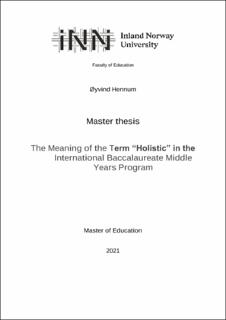The Meaning of the Term “Holistic” in the International Baccalaureate Middle Years Program
Master thesis
Permanent lenke
https://hdl.handle.net/11250/2753785Utgivelsesdato
2021Metadata
Vis full innførselSamlinger
Sammendrag
This thesis researches what the term “holistic” means in the Middle Years Program (MYP) curriculum framework (IB 2014) from the International Baccalaureate Organization (IB). It compares the MYP curriculum with principles of holistic education defined by authors (J. P. Miller 2007, pp 6-15; Rudge 2008, pp 21-22) in the field. The purpose of this research is to gain knowledge and insight from different perspectives on holistic education. The methodology is based on philosophical hermeneutics (Alvesson & Sköldberg 2009, p 91), with document analysis (Bryman 2016, p 581-583) as the method for data collection. Coding and subtraction of data are done in a deductive way (Braun and Clarke 2006, p 83-84) with a pre-existing coding frame based on principles of holistic education (J. P. Miller 2007, pp 6- 15). This study only concerns statements in a document (curriculum framework), and does not analyze implementation and practice.
The findings show some similarities between the principles of holistic education (Miller 2007, pp 6-15; Rudge 2008, pp 21-22) and the MYP curriculum, but there are also differences. One main finding is a similar concern for the education of the whole child (IB 2014, p 9; Miller 2007, p 11), focusing not only on intellectual development and academic achievement but also on students’ social, emotional, and physical wellbeing. Another main finding is similarities in focus on the relationship between the child and its community. The focus on developing international-mindedness to promote intercultural understanding, respect, and care for others is present in the MYP program (IB 2014, p 12). That is similar to the principle of interconnectedness (Rudge 2008, p 14-15) and the importance placed on the relationship between the individual and community (Miller 2007, pp. 13-14) in holistic education. One important principle of holistic education, the aspect of spirituality (Rudge 2008, p 25; Miller 2007, p 4), is less focused on in the MYP curriculum. Here the thesis’s findings suggest that IB is not in line with holistic education principles. The thesis discusses the main findings and includes a smaller discussion around teaching human rights and democracy in the MYP curriculum. Social change and democracy, including human rights, are important aspects of holistic education (Rudge 2008, p 22; Miller 2007, p 67), but seems less directly outspoken in the MYP curriculum.
The thesis concludes that there in some areas are significant similarities between holistic education principles and the MYP curriculum, but significant differences in other areas. I interpret the meaning of the word “holistic” in the MYP curriculum to be a concern for the education of the whole child and for the child’s relationship to its community.
